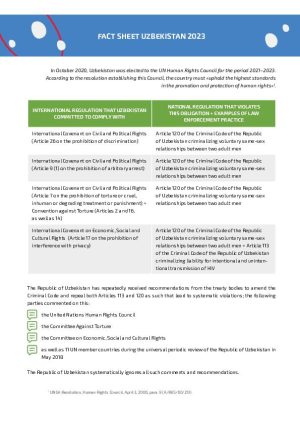Factsheet Uzbekistan 2022
The Republic of Uzbekistan has repeatedly received recommendations from the treaty bodies to amend the Criminal Code and repeal both Articles 113 and 120 as such that lead to systematic violations. The Republic of Uzbekistan systematically ignores all such comments and recommendations, despite having committed to comply with international regulations.
This factsheet summarises violations from international regulations and recommendations from the treaty bodies.

